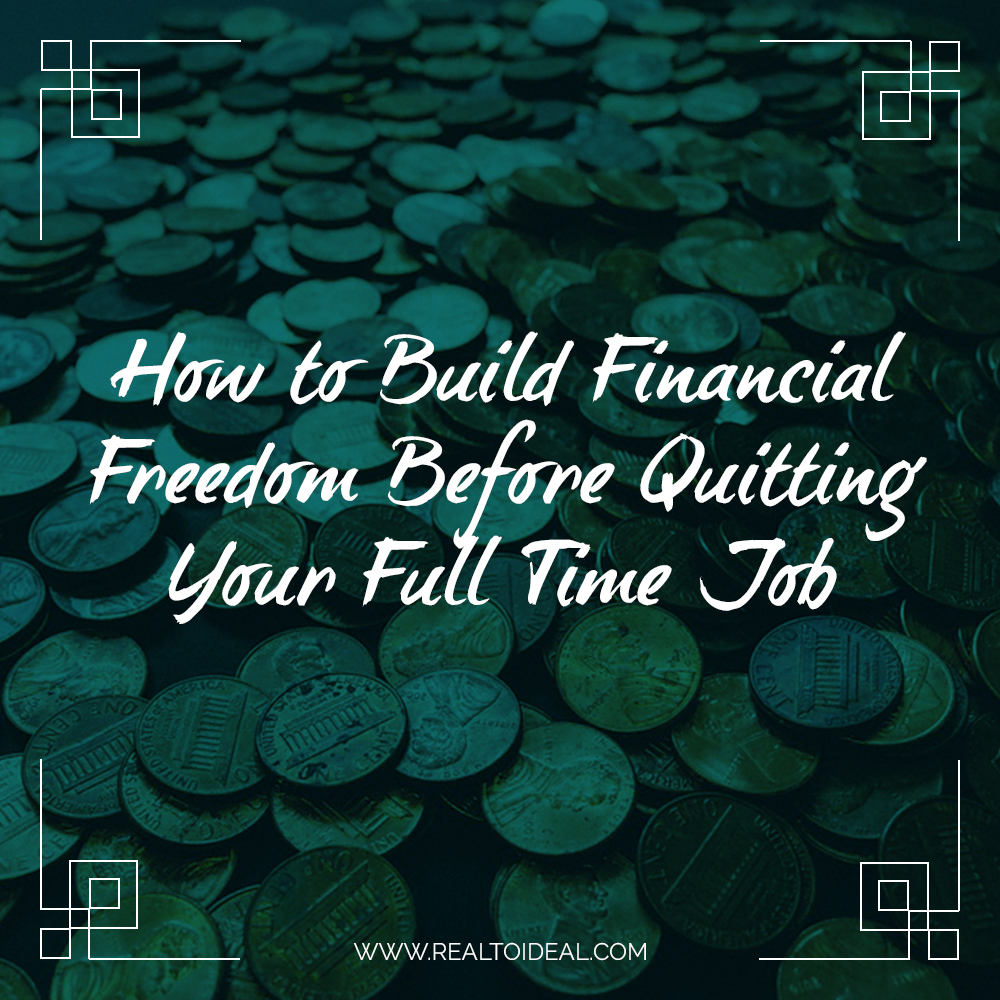Not everyone is ready to quit their job today and launch a new business that will be wildly successful before the next rent check is due.
Whether it’s practicality, responsibilities, crippling debt or just plain fear of the unknown, most people want to take it slow. Test the waters, start bringing income in before letting go of a steady paycheck. And there’s nothing wrong with that! By taking your time, you will make less mistakes, do things right the first time around, build a really solid and successful business that will flourish and carry you away from your current day job. So pat yourself on the back and pour yourself a glass of your favorite beer/wine/whisky/martini and celebrate your cleverness for finding Door #1 to an exciting new future being your own boss!
Take a look at my plan and feel free to build a similar one for yourself. Everyone’s situation is different, so you’ll want to custom tailor yours for YOU. (And of course, if you want any help with this, hiring a career coach is a great idea.)
When I first started thinking about starting my own business and leading a life of location independence and career freedom, I had $9k in my retirement account and $2k saved for a trip to Scotland. That savings eventually turned into $4k for Scotland (which I had a superb time spending!) and I returned home with $0 in the savings account. Worth every penny!
But as I write this, I have about $10k in the retirement account and $500 in my savings account. I also have a great health plan at work that includes medical, dental and vision. A plan I will miss when I strike out on my own.
So I’m giving myself 2 years to make this work. (If it doesn’t work out in 2 years, I won’t give up, I’ll just re-adjust my plan. But 2 years from now, I will certainly revisit this post and publish a status update!)
The 2 Year Countdown To Quitting My Day Job
Here’s my plan for the next 2 years:
Save a minimum of 8 months worth of rent and bills to keep in an account as a security net if anything should happen to my business and I need to make ends meet for a while. You may scoff – how will she save 8 months worth of spending in a mere 2 years? I’m counting on my side business bringing in most of that money over the next 2 years. If my business plan works out, this will be a cinch. I call this my independence fund but most people call this an emergency fund. My bank has a feature for setting financial goals and then shows my progress towards achieving those goals. I love this, because I can see my savings growing while watching the progress I’ve made towards saving this amount before my 2 year deadline. I can see when I’m on track (or not) and it helps me buckle down if I think my goal won’t be reached on time.
Keep working my current day job (which I’m no longer miserable at because I switched departments and found a role at the same company that I’m much better suited for). During this time, I am taking full advantage of the health plan and maxing out the company match in my 401k. IF, I decided to skip the 401k and put that money into savings, I might achieve my savings goal slightly faster (though not by much after taxes). But part of the reason I started a side business in the first place was to save for retirement faster. (See this facebook post about why I didn’t save a dime until I turned 35 and now I’m making up for lost time…) Thus, I didn’t want to miss out on the company match and have to make that up from my own income later. If you have a sizable retirement savings, you might choose to save the money in your emergency fund instead.
I don’t have a huge credit card debt, but it’s more than I make in a month. Therefore, I’m paying that off slowly but consistently so that when I leave my steady paycheck, I’ll have zero debt and all that credit as another backup in case I get hit with a major expense. I call this my major emergency fund because I won’t use it unless I get into an accident or my home burns to the ground or something else truly dire. Ideally, I want to live off my income, just straight cash in the bank, if at all possible. That way, I know I’m not getting in over my head, racking up expenses I can’t pay off with my business’ success.
One other thing I did strategically while I have the benefit of steady income right now – I took out a car loan. I didn’t actually need it, at least not right now. But, I knew it would be easier to get approved while I had a “normal” job, since that’s one of things lenders look at. And this way, I know I have a reliable car when I quit my 9-5 job. I’d hate to start off my new business venture and financial freedom with a car on the verge of dying and the major expense of replacing it right after quitting my job! Thus, I got the loan, bought a reliable car and this should be good to go for many years to come. When it’s time to trade it in, I should be in a great position financially to either buy a new one with cash or have a bank look at my business and agree that I’m loan-worthy.
If you have any intentions of making a major purchase in the next 5 years, you should definitely consider getting the loan approved before you quit your stable job! Make this a rock-solid part of your plan and be aware that this will, in part, decide how long you have to wait before quitting your 9-5 job – even if your biz takes off and is wildly successful ahead of schedule!
Well then, you get the idea. This is the groundwork for a solid financial plan for transitioning from a full time job to being your own boss. But just to make sure you put this into action, here is your homework:
An Exercise To Help You Save Money & Quit Your Full Time Job
This is a three part exercise starting with sitting down and actually plugging the numbers.
First, figure out what your actual budget is. Start tracking your expenses this week. Document everything you spend money on. Rent, food, bills, transportation, school, phones, etc. Write it all down or start a spreadsheet. Add to this list all month and take a real look at what you spend. Next, make a list of your yearly expenses (taxes, insurance, web hosting, car maintenance, etc.). Add your annual expenses together and divide that number by 12. Add this final number to your monthly expenses and get a grand total of what you need to survive each month.
Second, figure out if there is anything you can live without. Can you cancel cable tv and live off of Netflix, BBC Online or something like that? (Even Amazon prime is cheaper per month than most tv subscriptions.) Can you reduce your cell phone bill? Is there something you pay for every month but don’t use? Get really creative here and consider every possibility to reduce your monthly expenses.
Once you figure all this out, you should have a crystal clear idea of the minimum amount of money you need to survive.
Part three is to spend only that minimum amount each month and put the rest away in savings. The idea here is learning to live off that minimum amount and stop being accustomed to all the extra money you make now. It will be difficult at first but you get used to it! Bonus – you’ll start building a savings that you can count on when you’re ready to quit your job and run your own business full time.
This is key – you probably won’t make as much money as you make right now when you first quit your job and run your own biz full time. But you will very likely get to this level again someday. Part of the psychology of succeeding as your own boss is to not get discouraged when you first break out on your own. It will be a little scary when you first cut the strings to steady paychecks. But it will be much easier if you’ve already gotten over the discomfort of living below your current means. You don’t want to go through withdrawals from your luxurious lifestyle at the same time that you are making it on your own for the first time. Increase your chances of success by getting over this hurdle while you still have the comfort of regular paychecks. Replace that feeling of luxury by watching your savings account grow profusely!


Well I guess I don’t have to spend the weekend fiiurgng this one out!